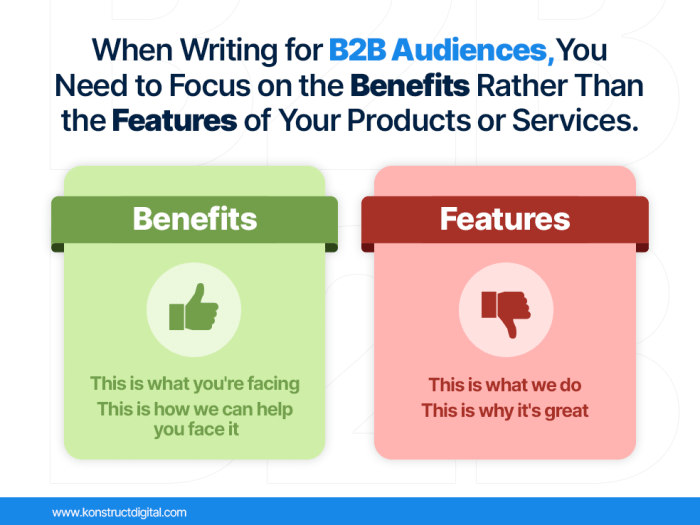Writing for B2B Audiences sets the stage for creating engaging content that resonates with businesses, blending industry expertise with a creative flair that captivates readers.
Dive into the world of B2B writing where storytelling meets strategy for impactful communication.
Importance of Writing for B2B Audiences

In the world of business, effective communication is key to success. When it comes to writing for B2B audiences, there are distinct differences compared to writing for B2C audiences. B2B writing focuses on providing detailed information, building credibility, and establishing trust with other businesses rather than appealing to individual consumers. Understanding these differences and tailoring content accordingly is crucial for achieving positive outcomes in the business-to-business sphere.
Key Considerations for Tailoring Content for B2B Readers
When crafting content for B2B audiences, several key considerations should be kept in mind. Firstly, it is essential to focus on providing valuable and relevant information that addresses the specific needs and pain points of other businesses. Tailoring the content to showcase how your products or services can solve their problems or improve their operations is crucial for engaging B2B readers.
Furthermore, maintaining a professional tone and utilizing industry-specific language can help establish credibility and build trust with B2B audiences. Avoiding overly promotional language and instead focusing on the benefits and value propositions of your offerings can make your content more compelling and effective in the B2B space.
Impact of Effective B2B Writing on Business Outcomes
The impact of effective B2B writing on business outcomes cannot be overstated. Well-crafted content that resonates with B2B audiences can lead to increased brand awareness, improved lead generation, and ultimately, higher conversion rates. By establishing your business as a trusted authority in your industry through informative and engaging content, you can attract more quality leads and drive growth for your organization.
In conclusion, writing for B2B audiences requires a strategic approach that focuses on providing value, building credibility, and fostering trust with other businesses. By understanding the unique needs and preferences of B2B readers and tailoring your content accordingly, you can achieve significant positive outcomes for your business in the competitive B2B landscape.
Understanding the B2B Audience
When it comes to writing for B2B audiences, it’s crucial to have a deep understanding of who these readers are and what they are looking for. Let’s dive into the characteristics of a typical B2B audience, explore content types that resonate well with them, and discuss how audience analysis shapes effective communication strategies.
Characteristics of a Typical B2B Audience
- B2B audiences are often composed of professionals and decision-makers within businesses.
- They have a specific focus on industry-related topics and are looking for valuable insights and solutions.
- These audiences are typically more interested in data-driven content and case studies that demonstrate real-world results.
- They value content that helps them make informed decisions and solve business challenges.
Content Types that Resonate with B2B Readers
- Whitepapers: In-depth documents that provide valuable industry insights and solutions.
- Case Studies: Real-life examples showcasing how a product or service has helped businesses achieve success.
- Infographics: Visual representations of data and information that are easy to digest and share.
- Educational Guides: Resources that help B2B audiences understand complex topics or industry trends.
Audience Analysis in B2B Communication
- Understanding the needs, preferences, and pain points of the B2B audience is essential for crafting targeted and effective content.
- By conducting thorough audience analysis, writers can tailor their messaging to resonate with the specific interests and challenges of B2B readers.
- Audience analysis informs the tone, style, and messaging strategies used in B2B communication, ensuring that the content is relevant and engaging.
Crafting Compelling B2B Content: Writing For B2B Audiences

When it comes to creating engaging B2B content, there are some best practices that can help you stand out in the crowd. One key element is storytelling, which plays a crucial role in captivating the audience and making the content more relatable. Additionally, finding the right balance between industry jargon and accessible language is essential to ensure that your message is clear and easily understood by your target audience.
The Role of Storytelling in B2B Writing
Storytelling in B2B writing involves using narratives to convey information, create emotional connections, and engage the audience on a deeper level. By incorporating storytelling elements such as characters, conflicts, and resolutions, you can make your content more memorable and impactful. This approach helps humanize your brand and products, making them more relatable to your B2B audience.
Balancing Industry Jargon with Accessible Language, Writing for B2B Audiences
Finding the right balance between industry-specific terms and accessible language is crucial in B2B content. While industry jargon is important for demonstrating expertise and credibility, using too much of it can alienate readers who are not familiar with the technical terms. To strike the right balance, consider your target audience’s level of knowledge and expertise, and use plain language to explain complex concepts. This approach ensures that your content is both informative and easy to understand for a wider audience.
Tailoring Tone and Style for B2B Writing
When it comes to writing for B2B audiences, maintaining a professional tone is crucial for establishing credibility and trust with clients. The way you communicate can greatly impact how your brand is perceived in the business world.
Importance of Professional Tone in B2B Communication
- Professionalism in communication helps to build trust and credibility with B2B clients.
- A professional tone conveys expertise and reliability, making your brand more appealing to potential partners or customers.
- It is essential to maintain a professional image in order to be taken seriously in the B2B market.
Adapting Writing Style to Match Brand Voice
- Research and understand the brand voice of your B2B clients to ensure your writing style aligns with their values and messaging.
- Use language and tone that resonates with the target audience of the B2B client, while still maintaining professionalism.
- Customize your writing to match the specific industry and preferences of each B2B client for a more personalized approach.
Impact of Tone and Style on Establishing Credibility
- The tone and style of your writing can impact how B2B audiences perceive your brand’s credibility and expertise.
- A consistent and professional tone helps to establish trust and authority in the industry, leading to stronger relationships with clients.
- By adapting your writing style to match the brand voice of B2B clients, you can create a cohesive and trustworthy image that resonates with the target audience.